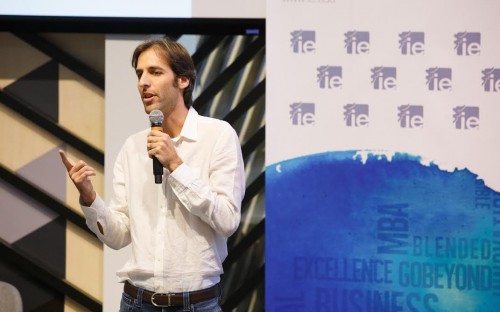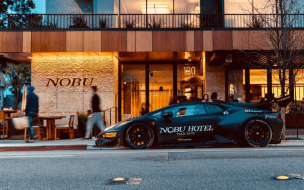Then, eight months after joining the school, he entered IE’s Venture Lab and started his own business. Today, he works as CEO of Madrid-based tech startup Never Empty, which has developed an innovative, name-your-own-price ticketing platform to combat the issue of empty seats at soccer matches and other live events.
On the Never Empty platform, sports and music fans bid for tickets to live events at the price they’re prepared to pay. At the same time, venues control the minimum ticket price they’re prepared to accept based on real-time demand.
Since its launch in 2013, Never Empty has raised over $1.5 million in funding. It’s present in Spain and Israel, and used by soccer clubs across the Spanish leagues, including 10-time La Liga winners Atletico Madrid. Matan is planning to expand into the UK and the US in 2017.
Originally from Israel, Matan trained as a lawyer, worked as a psychometric test prep instructor, and scored a mammoth 760 on the GMAT, before relocating to Spain for his MBA.
IE Business School’s one-year MBA is ranked eighth in the world, and first in Europe for entrepreneurship, by the Financial Times. Alongside his business, Matan advises and mentors early-stage startups within IE’s Startup Lab and Venture Lab.
How did the idea to start up Never Empty come about?
I’ve always been a huge sports and live events fan. Nowadays, in live event ticket pricing, the venue sets a price for a ticket. You either have events which don’t sell out, or you have sold out events where 50% of the tickets end up being re-sold on the black market. In both cases, you have a market inefficiency.
I set out to develop a ticketing platform where customers name the price they want to pay to go to a live event. This enables an exact match between a market value of a ticket and what the venue receives for it. With this idea, I went into IE’s venture lab, and teamed up with a fellow student, to take the concept further.
Where are you at right now? What do you hope to achieve?
After IE, we were lucky enough to close around half a million dollars in funding from private angel investors based mainly in the US and Israel. We started building a team, a platform, and running tests with small soccer clubs in the Spanish third division, before moving up the divisions. Within a year, we were working with some of Spain’s largest soccer clubs including Atletico Madrid, Espanyol, and Malaga.
The mission of the company is to eliminate empty seats at live events. Our total funding to date is over $1.5 million. We’re present in Spain and Israel. And we’re planning to launch in the UK and the US in 2017.
How have you been supported by IE Business School?
IE has a great reputation. Many of the leading figures in the entrepreneurial world – especially in Spain – have either studied at or know about IE. So being part of the IE network is extremely helpful.
At the beginning, I was reaching out to investors, looking for suppliers, marketing agencies, lawyers, and accountants. IE has access to these kinds of people. I was also lucky enough to receive great support from the venture lab, and many of IE’s professors. Erik Schlie, the business school’s associate dean, has been extremely helpful from the get-go.
What advice do you have for MBAs looking to start their own business?
Take as much advice as possible! Know when to stick to your guns, but always look for advice from people who have more experience than you.
With any product, the idea is to launch it as quickly as possible. No business plan survives first contact with the market. It doesn’t matter how basic or ugly your product is, you need to get it out there. If you don’t think your first version of a product is ugly, you’re doing something wrong!
Why did you decide to pursue an MBA at IE Business School?
I wanted a one-year, European MBA experience. Taking a two-year break for an MBA is a big move, both financially and career-wise. And, if you look at the curricula of two-year and one-year MBA programs, they’re almost identical. Two-year programs are simply spread out over a longer period.
I visited IE in Madrid in person, and I was extremely impressed both with the school and the city. I didn’t go into my MBA thinking that I was going to become an entrepreneur, but the entrepreneurship focus was definitely something that drew me to IE.
What should applicants think about when deciding to do an MBA?
Those who can afford it should visit the school and get a first-hand experience; nothing beats that. The rankings can only tell you so much. Try to talk to students and graduates from the school.
The GMAT is just about studying and learning all the little tricks. There’s a lot of strategy behind standardized testing. With the correct methodologies, you can increase your score by up to 100 points.
Would you be where you are now without the IE MBA?
Definitely not! When you grow up in a certain country, and in a certain industry, you develop tunnel vision. Everything you see around you revolves around your industry; in terms of career progression, what you think you can do, where you see yourself five-to-ten years down the road.
Then, suddenly you get thrown into an atmosphere where you’re studying with people from 60 different countries, and hundreds of different roles and industries you’ve never even heard of. The MBA opens your mind.
RECAPTHA :
ec
0a
25
f0







